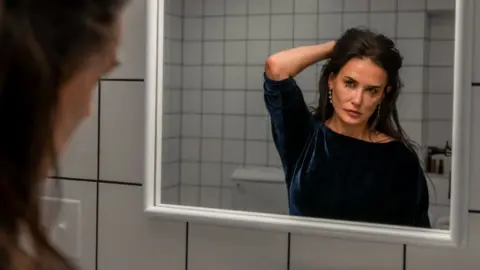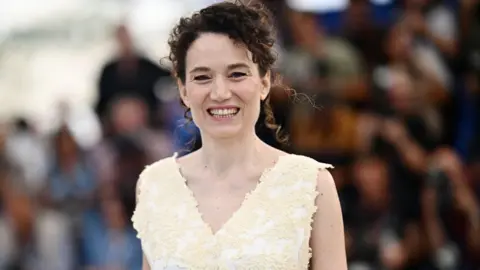
 Mubi
Mubi
Demi Moore plays a fading TV star who goes to extreme measures to achieve youth and beauty
Demi Moore's new film, The Substance, begins normally enough.
Set in Los Angeles, it opens with an aerial view of the Hollywood Walk of Fame, where a new star is being installed. Builders are seen taking great care as they lay it, and there is great fanfare when it opens to the public.
But over time, the star honouring Moore's character Elisabeth Sparkle becomes cracked and damaged. It gets trampled on and ignored. One passing man drops his burger, leaving it smeared with ketchup.
The whole sequence lasts only a minute or two, and although the metaphor is unsubtle, it perfectly sets the tone for the film that follows; its themes of youth, beauty and relevance, and how far people will go to achieve them.
Then the movie takes a very dark turn.
Fired from a TV show due to falling ratings, Sparkle goes to extreme lengths to create a perfect version of herself. The Substance ultimately becomes a straight-up body horror, packed full of blood and gore, which has prompted both controversy and acclaim.
"It was a completely unique, out-of-the-box script, you could tell it was visually stimulating," Moore tells BBC News, "and at the same time, we had no idea how it would end up, which made it even more risky and juicy."

 Mubi
Mubi
Demi Moore's character takes a black-market drug which generates a beautiful, younger clone (played by Margaret Qualley)
The role required the 61-year-old to embrace being unglamorous, to put it mildly, highlighting her ageing character's own fading beauty.
"I felt like that was why I wanted to do it, in a way," Moore reflects. "Part of what made it interesting was going to such a raw, vulnerable place, to really kind of peel away. And it was quite liberating in many respects."
A feminist film about ageism and unrealistic beauty standards is not unusual, but what makes the film so gruesome is the titular substance used by the main character.
The movie sees Sparkle use the black-market drug to - quite literally - split herself in two, creating a younger, more beautiful version of herself (played by Margaret Qualley).
Initially, living as her alter-ego brings her everything she ever wanted. But it doesn't take long for the wheels to come off as Sparkle moves back and forth from body to body.
'Intense themes'
Director Coralie Fargeat says the casting process was a "big challenge", but adds Moore "really understood the part".
"I knew from the start that with that kind of story, casting an actress to confront those very intense themes, which are resonating very closely, was going to be really difficult," she tells BBC News.
The director, who made her feature debut in 2017 with Revenge, says she was looking for an actress who would "represent the scale of the role I wanted, together with someone who would take the risk to jump in this".
"And when the idea of Demi came on the table I was really sure she wouldn't want to do it, I thought it would be too scary. And when I heard she reacted positively to the script, it was like, 'Oh my god! I was very surprised."

 Getty Images
Getty Images
Demi Moore (and, far more importantly, her dog) were warmly welcomed at the film's Cannes launch
The Substance will likely leave you conflicted. The first hour or so is exactly what cinema should be - daring, original, engaging.
The second half of the film isn't necessarily worse, but your opinion of it will depend on your tolerance for gore.
Qualley herself highlights that, in an age where many acclaimed directors are making "quiet, intimate films", she likes how this one "smashes you over the head".
Some reviews have awarded the film five stars, including the Telegraph's Tim Robey, who wrote: "The Substance is a humdinger of a satirical horror-thriller, by turns hilarious, affecting and jaw-droppingly grotesque."
"The Substance will get you thinking, talking and squirming," added Rolling Stone's Anna Smith. "Body horror [is pushed] to the limit, daring the viewer to keep looking rather than hide, wretch or even vomit – all reactions are entirely feasible."
Not everybody was a fan. Kevin Maher of the Times called the film "puerile, pointless and intellectually specious", noting that some audience members walked out of the Cannes Film Festival screening.
Issues of taste aside, Moore and Qualley turn in arguably the best performances of their respective careers, with Moore especially impressive as Sparkle descends into madness.
Fargeat says that, when she met Moore: "I got to know a lot more of who she was as a person, what she had overcome in her own life to get to a place where she felt strong enough and good enough with herself to confront all this vulnerability.
"I felt she really understood what I was going to request from her. The filmmaking, the level of risk-taking, nudity, and she was ready to take those risks."

 Mubi
Mubi
The body swap brings unintended and gory consequences for Sue, the younger version of Elisabeth Sparkle
Moore's is the more wide-ranging role, but Qualley had a different kind of challenge, having to portray someone who is supposed to be the embodiment of perfection.
"I've never felt so defensive of my own body," she says, "so I think it taught me to appreciate what I have, and gave me a closeness to myself that I really value."
Defensive in what way? "When you're meant to be playing perfect, and you've got close-up shots of your butt, and you've got fake boobs on, and you're wrapping yourself up like a piece of candy, the whole goal is to create this character that looks perfect," she explains.
"And in doing so we're changing all the little pieces of me that are not perfect, hiding what's not perfect about Margaret in order to make me Sue, and so I was really excited to go back to being me."
Moore picks up: "I feel in a lot of ways like Margaret had a more pressured situation [than me] with it having to be more perfect. I felt great that I could show up and look like [rubbish]!"
Oscars potential
Awards pundits have been debating whether the film could have an impact on the Oscars race. The quality is certainly there in the screenplay, directing, make-up, special effects, soundtrack and acting.
Many feel Moore in particular is overdue some Academy recognition, following a long career with film credits including Ghost and A Few Good Men.
But The Substance may be a bit too much to stomach for some voters. It will be fascinating to see whether or not the Oscars go for it.
Moore chooses her words carefully when asked about the possible awards the film might bring, as is often the case for actors who don't wish to jinx any potential Oscars.
"Always when you do something, you hope that it resonates, and hope that it has an impact, and I certainly appreciate things that are thought-provoking," she says.
"More than anything, I hope there is a real cultural shift, that this can open the pathway for. So where that goes, I don't know."

 Getty Images
Getty Images
Director Coralie Fargeat made her feature film debut with 2017's Revenge
The film has been seen by many as a comment on Hollywood's absurd beauty standards.
Fargeat reflects: "It's about what women look like, and how everything that is projected on them, from a young age, shapes their state of mind.
"From the self-hatred and feeling that they're never good enough, beautiful enough, thin enough, young enough. At each age, there is something that can make you feel like you're not right."
Conversations about beauty standards within Hollywood specifically have become more enlightened in recent years, with Moore acknowledging "we've definitely made progress".
"Do we have steps to take to go further? Most definitely," she reflects. "But I think there is already so much more diversity and representation of women in various forms of beauty, whether it's ageing, race, size. And from where I started, that's come a long way."
The Substance is released in UK and US cinemas on Friday (20 September).

 Movie
Movie 3 months ago
96
3 months ago
96 






![Presidents Day Weekend Car Sales [2021 Edition] Presidents Day Weekend Car Sales [2021 Edition]](https://www.findthebestcarprice.com/wp-content/uploads/Presidents-Day-Weekend-car-sales.jpg)



 English (United States)
English (United States)